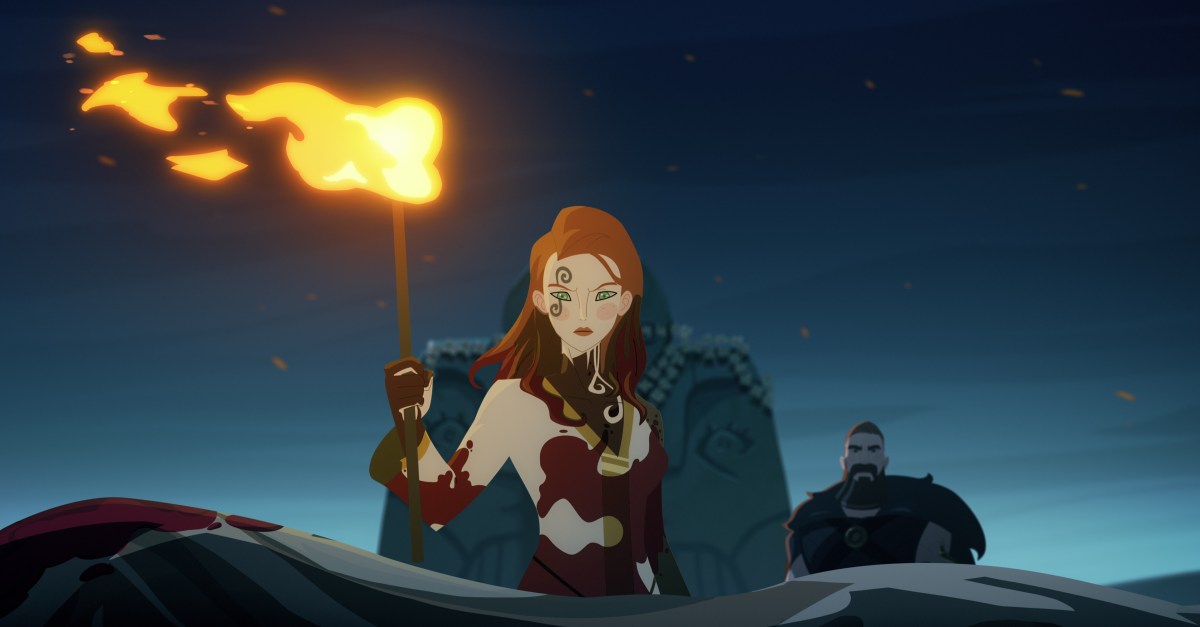“Fuck the gods” is a sentiment that feels like it’s everywhere right now, from the more literal interpretation of Netflix’s Kaos to the variety of “eat the rich” narratives tapping into the simmering anger at the present growing inequality. Ragnarök, the mythological end of many of the gods in a fit of brutal battle and vengeance, is exactly the sort of thing that can speak to how fitfully unfair and end times-adjacent modern life can feel at the moment. Particularly if, like in Twilight of the Gods’ rendition, there’s a mortal who is suffering grave offense at the hands of the deities.
You don’t have to have been a bride to understand that if Thor showed up in the middle of the ceremony and killed your whole family, it’d be upsetting. Twilight of the Gods’ Sigrid (Sylvia Hoeks), however, doesn’t have to imagine; after journeying home to marry her one true love, Leif (Stuart Martin), the Norse god of thunder massacres her loved ones right in front of her. And now she has sworn vengeance, come hel or high water.
That revenge saga is the beating, bloodied heart of Twilight of the Gods, created by Zack Snyder, Eric Carrasco, and Jay Oliva. It’s the sort of story wonderfully served by being animated; as Sigrid assembles a team to invade Valhalla and kill the hammer-wielding god once and for all, she and her cohort can encounter a sorceress in the woods or ride across a magical bridge to the land of giants without the show ever breaking stride. Plus, the character design teases the series’ varied influences and colors our sense of the characters for an added bit of fun. Sigrid looks like she might be riding straight out of The Secret of Kells, flatter and harkening back to older-world art, while some in her troupe feel closer to ’90s DreamWorks, with all their hopeful humanity. It reflects how she is a bit out of step with those around her — changed by all she’s gone through.
As with Rebel Moon or Zack Snyder’s Justice League or Man of Steel (or 300 or Sucker Punch), those who do or don’t jibe with Snyder’s sensibilities as a storyteller will likely find their instincts confirmed here. This is a guy who paints with bold colors, big emotions, and bombastic sex and violence. Still, it can sometimes feel like the chosen medium gets in the way of some of the palette really packing a punch. As the journey picks up and battles get more harried, the cartoonish nature of the animated violence never really stops holding the story back.
In that way, Twilight of the Gods can often feel less like the mythic highs of Ragnarök and more like Prime Video’s The Boys. Like Twilight of the Gods, The Boys is deeply concerned with what divine beings owe to us, and how their indestructibility can deaden them to cruelty of the highest order. Both shows start with gruesome tragedy giving way to rough retribution. And both shows ultimately push past sex scenes and gruesome violence in order to find a more thoughtful exploration of grief, rage, connection, and malice. It’s fun that Snyder’s take on the superheroes of the moment carries a bit more of an epic weight to it. The battles of gods and men have long been his domain, and to see it literalized here (with a few giants and other Norse mythology thrown in) only strengthens the themes he’s so often interested in exploring around power and control.
Twilight of the Gods’ ultimate success feels like it’s reflected best in the fact that no one sets off to kill a god for the same reason. It allows what could be a pat animated retelling of myth to become something knottier, tricky, and brutal as we see how vicious a saga it can be. Though not all its beats are served by the animated world, the show is far from just more fodder for the Netflix animation row, full of richly imagined and varied takes on gods, realms, and, yeah, sex scenes. This is a series that could go places, as evidenced by the ruthlessness demonstrated in its final episodes. It’s worth making time for — gods be damned.
Twilight of the Gods is now streaming on Netflix.









Comments are closed